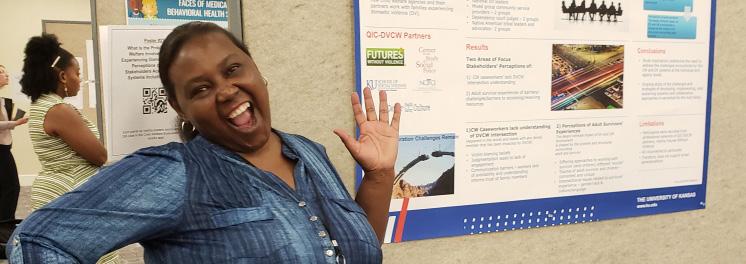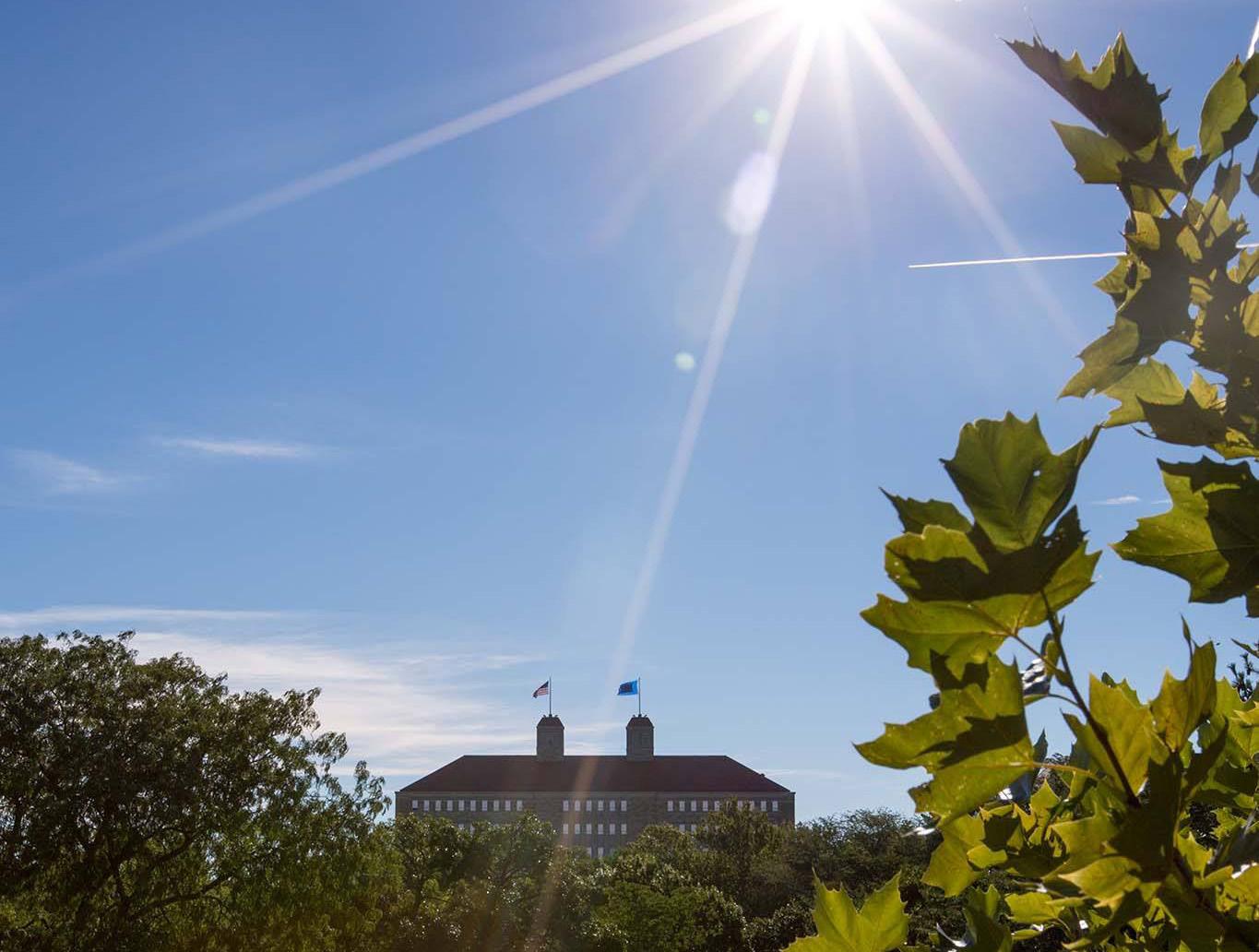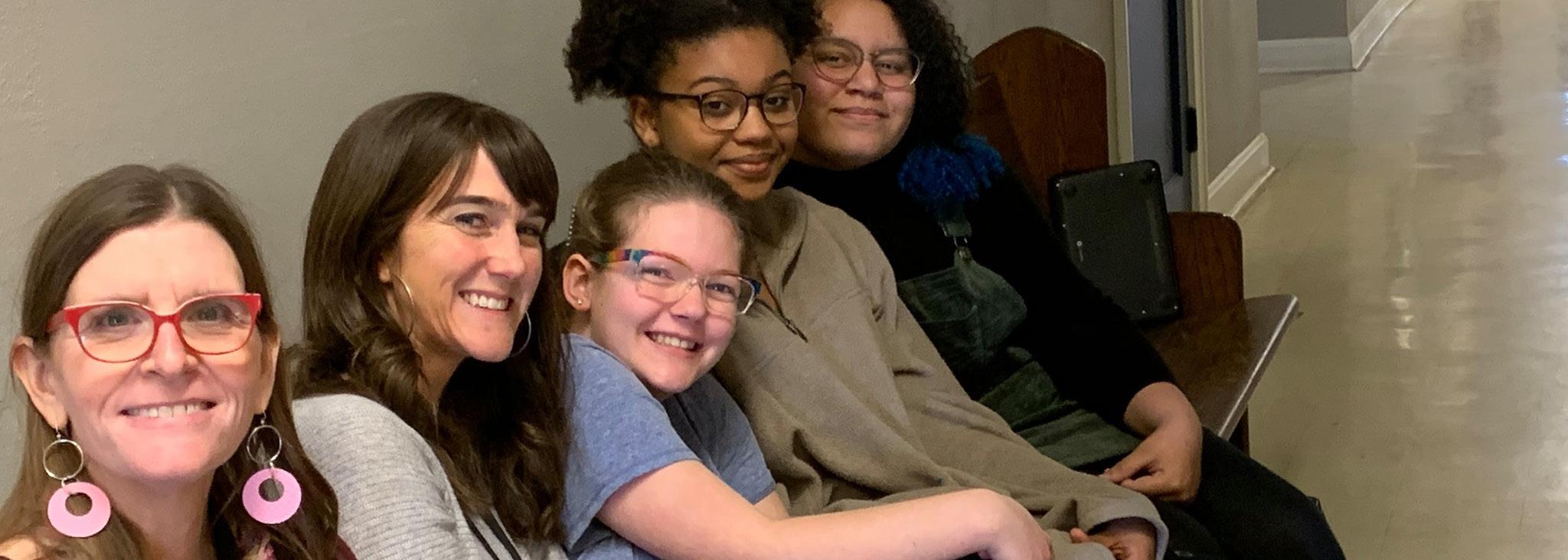
7 minute read
STRATEGIC PRIORITY 2: Innovation & Quality Education
STRATEGIC PRIORITY 2:
Innovation & Quality Education
We will inspire social justice advocates around the world to seek out the University of Kansas School of Social Welfare as their educational partner. We will provide a unique and memorable student learning experience that will attract undergraduate and graduate students to a social work education as the degree choice for those wanting to be change agents and to help society’s most vulnerable. Throughout their experience, students will receive comprehensive support, be challenged to explore their passions while building relationships and learning to practice with integrity, use critical inquiry to analyze and challenge existing structures and systems, discover the intersection of micro/macro social work practice and build collaboration across systems and disciplines to create multi-level change.
GOAL 1: Increase student enrollment in the BSW, MSW, and PhD programs each year with focus on recruiting, supporting and retaining under-represented students.
TACTICS • Dedicated recruiter and Edwards Campus Student Success Coach • Annual Recruitment Strategic Plan and acquisition of software/systems to implement and track plan activities • Focused diversity recruitment efforts as part of the recruitment strategic plan • Review recruitment plan activities with the Associate Dean for Diversity, Equity and Inclusion and the Liaison to Native Communities and find ways to collaborate • Relationship development with colleges, universities, high schools and organizations that serve under-represented prospective students • Increase recruitment staff availability at and support of events organized by and for under-represented populations • Increase virtual opportunities to meet with prospective students • Create additional collateral materials to display content and images pertinent to diverse populations • Promote Vision of Justice at all levels of enrollment funnel and incorporate Vision of Justice language into promotional materials • Ongoing training to educate student success team on recruitment and support for under-represented students • Work closely with Haskell social work program and student groups and organizations that serve under-represented students to provide personalized assistance with the application process • Ensure admission requirements are inclusive: eliminated the GRE requirement, availability of fee waivers • Development of the advancement strategic plan and coordination with Endowment Development Director to increase funding to support students • Review scholarship funds to ensure usage and support for students of color • Continually examine scholarship award criteria and adjust when possible to provide support for students with highest need • Apply for additional sources of funding such as Graduate Studies diversity recruitment funds
GOAL 2: Challenge norms and embrace the changing world of higher education by providing a learning environment with high impact opportunities (research, field education) that is flexible, supportive, and safe, and promotes a culture of continually assessing, questioning and improving practices, policies and systems by adopting throughout the curricula unconditional regard for critical inquiry.
TACTICS • Re-imaging curricula and adding value to the program through specialization, interdisciplinary programming, community partnerships and/or offering program options that are flexible and diverse • Formed Curricula Re-imagining Committee • Added Child Welfare Certificate and evaluate other certificate options • Collaborate with KU departments and community organizations • Established new PhD Curriculum • Launching a DSW program • Addition of simulations and interactive courses • Explore online BSW and MSW programs • Launch online MSW macro certificate • Providing opportunities to assist in curriculum development that will include interdisciplinary and community collaboration • Research discussions with Curriculum Revision Committee about additional means of integration • Center for Teaching Excellence engaged faculty • Collaborative interprofessional learning opportunities with 11 partners through the Integrated Health Scholars Program • Redesigned all classes to be delivered in a highly dynamic and engaging online format during pandemic • Increase flexibility and convenience through numerous class formats, days and times of class offerings and locations • Expanding Partnership Sites: Garden City, Salina, Pittsburg • Field Office strategic plan • Continually expanding relationships with practicum placements sites to provide real world experience through the required practicum • Provide three faculty led study abroad locations focusing on global social work • Increase research opportunities for students at all levels • Develop of research opportunities handout for BSW and MSW students • Formed a School Research Council to help incorporate research opportunities into curriculum • MSW Research Scholars Program • Compile research products/resources which might have use in coursework • Placement of macro MSW students in research office and Center for Community Engagement and Collaboration • Provide support through advising, mentoring and funding for a successful journey • Required orientations each year for all programs and field education • Offer 1:1 PhD mentoring and three years guaranteed funding • Established a student emergency fund • Required academic advising for undergrads each semester • Provide all students with the opportunity for professional and faculty advising • Individualized field practicum support at the rate of 32,575 hours/year • Increased communications with students during pandemic to keep students up-to-date, clarify conflicting or confusing messages, ease anxiety, and promote a “Needs and Concerns” form, which provided an accessible way to request needed resources to continue their education • Dedicated student success advisors and Edwards Campus Success Coach who acts as a one person contact for the student from recruitment to graduation • Allow freshman to be admitted directly into the program, which allows students to attend orientation and utilize internal advisors • Availability of a Living Learning Community housing option that provides additional resources and mentorship opportunities • Created the Pathways to the Profession, a professional development series for current students to provide additional opportunities that support students with career development • Additional mentoring and scholarship through three scholars programs 18
Provide students with resources to improve the student experience and aid in the successful completion of the program and beyond • Developed GRA orientation materials • Improve content and availability of new student resources (handbook, website, policies, etc.) • Updated MSW Student Standards and Advancement Policy • Offer licensure prep classes • Revised Grievance Policy with specific attention paid to DEI Provide comfortable multi-use spaces in Twente Hall to draw students into the building Regular Student Success Team meetings
GOAL 3: Produce high quality graduates prepared to practice across system levels, ready to make their own mark on society and move the world towards a more just place.

TACTICS • Engage community partners to assess the preparedness of our graduates to meet the changing social work profession • Ask for input from alumni, adjunct instructors and field education representatives through surveys and focus groups • Dean visits with community partners, alumni and donors • Associate Director of Field Education position designed to provide agency focus • High alumni engagement through field education and adjunct instructors • Faculty/adjunct instructor syllabus development and mentorship • Integrated Health Scholars Program partnerships • Attendance at coalition meetings across the state • Collaboration with Haskell Indian Nations University • Coordinate with partnership sites to offer a mutually beneficial program for both programs and students • Gain valuable input from student • Provide opportunities for student input through informal events such as Cookies and Conversation with Carney • Six student advisory committees • Ensure student representation on faculty and staff committees • Numerous surveys - school DEI climate survey, PhD survey, implicit curriculum survey for bachelor’s and master’s students, teaching evaluations • Surveyed students to gain their perspective and desires around class formats during pandemic • Continuous evaluation through the accreditation process with the Council on Social Work Education • Annual review of 13 interrelated competencies and component behaviors that are comprised of knowledge, values, skills and cognitive and affective processes
GOAL 4: Celebrate and acknowledge student successes and diversity
TACTICS • Provide opportunities to acknowledge, support and honor diversity • Provide Ethnic/Racial stoles for graduates to wear the stoles throughout graduation weekend • Highlight alumni and students of color in School materials and sharing their success stories on website/social media • Conference Room 208 will house art and history panels that outline School and University of Kansas history as it relates to DEI • Events and communications through email communications, social media, website highlights, etc. • Margo Award, Integrated Health Scholars and Diversity, Equity and Inclusion Scholars presentations, art collectives • Virtual graduation that honored each individual graduate with personalized slide highlighting accomplishments • Graduation gift and words of encouragement from notable alumni
GOAL 5: Enhance training, support and recognition for all instructional faculty
TACTICS • Waiting on list from Jason.









